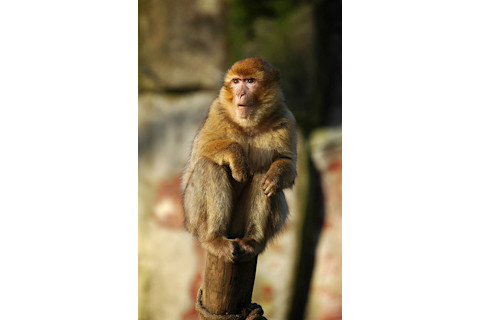
The number of traits chalked up as "distinctly human" seem to dwindle each year. And now, we can't even say that we're uniquely aware of the limits of our knowledge: It seems that some monkeys understand uncertainty too. A team of researchers taught macaques how to maneuver a joystick to indicate whether the pixel density on a screen was sparse or dense. Given a pixel scenario, the monkeys would maneuver a joystick to a letter S (for sparse) or D (for dense). They were given a treat when they selected the correct answer, but when they were wrong, the game paused for a couple seconds. A third possible answer, though, allowed the monkeys to select a question mark, and thereby forgo the pause (and potentially get more treats). And as John David Smith, a researcher at SUNY Buffalo, and Michael Beran, a researcher at Georgia State University, announced at the AAAS meeting this weekend, the macaques selected the question mark just as humans do when they encounter a mind-stumping question. As Smith told the BBC, "Monkeys apparently appreciate when they are likely to make an error.... They seem to know when they don't know." These findings aren't applicable to all species of monkeys: The researchers also trained capuchin monkeys, and this species never selected the uncertainty button. These findings may have important evolutionary implications because macaques and capuchins have different lineages: macaques are old world monkeys, and capuchins are new world monkeys. Smith told the BBC:
"There is a big theoretical question at stake here: Did [this type of cognition] develop only once in one line of the primates - emerging only in the line of Old World primates leading to apes and humans?"
This research is more than just monkey business too: It could shed light on our own cognition. Smith explains to the BBC:
[The] capacity to think in this way was "one of the most important facets of humans' reflective mind, central to every aspect of our comprehension and learning.... These results... could help explain why self-awareness is such an important part of our cognitive makeup and from whence it came," he added.
Related Content: The Loom: Monkeys in the Mirror and the Nature of Science Not Exactly Rocket Science: Do Young Female Chimps Play With Sticks as Dolls? 80beats: Why Gorillas Play Tag: To Learn Social Etiquette and to Settle Scores 80beats: Chimp Gathers Stones for “Premeditated” Attacks on Zoo Visitors DISCOVER: The "Monkey Whisperer" Learns the Secrets of Primate Economics
Image: flickr / mape_s













